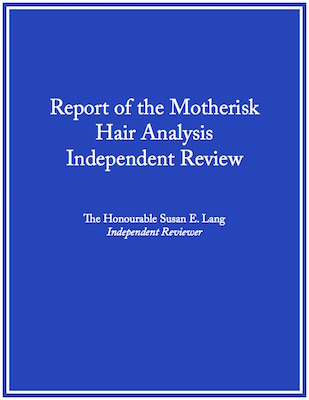Following R. v. Broomfield and its finding that there was genuine controversy about the hair testing done at the Motherisk Drug Testing Laboratory (“MDTL”), the Ontario government established an Independent Review headed by retired Court of Appeal Justice Susan Lang to investigate and make recommendations about the hair strand drug and alcohol testing at the “MDTL”. She delivered the 342-page document, entitled the Report of the Motherisk Hair Analysis Independent Review (the “Lang Report”) on December 15, 2015.
With the assistance of scientific experts, Justice Lang undertook a careful examination of the science of testing hair for drugs of abuse, and the methodologies available to do so. She found that the testing methods used by the “MDTL” were inadequate and unreliable for use in child protection and criminal cases. She noted that the laboratory operated in a manner that did not meet internationally recognized forensic standards, and in the absence of meaningful oversight from SickKids.
As part of her review, Justice Lang spoke to Ontario child protection agencies about the extent to which they relied on hair strand tests from the “MDTL”. Most agencies reported that a positive test result was one among several factors that they used to assess a parent or caregiver. Other stakeholders, such as the Family Lawyers’ Association, whose members represent parents in child protection proceedings, felt that the test results were highly relied upon. Justice Lang examined a number of individual child protection cases where hair tests from the “MDTL” were offered as evidence. She found that in some of the cases that she looked at, the test results were treated as a small factor by the protection agencies and the Court: there were many other concerns about a parent or caregiver. In other cases, however, the results were given significant weight. When the results from the “MDTL” were brought before a court, they were generally not subjected to the rigorous testing that is required for expert evidence.
Justice Lang noted that public confidence in the justice system requires that the evidence used in a criminal or child protection case be adequate and reliable. The hair testing done by the “MDTL” failed to live up to that standard. The conclusion that she reached was that use of the hair strand evidence in child protection and criminal cases had serious implications for the fairness of those cases. Accordingly, a review of those cases was warranted.
The MRC and its Review and Resource Centre were created and tasked with reviewing cases to assess the impact of hair strand testing for individuals and families who were or are involved with Ontario child protection agencies. The Review and Resource Centre was also established to provide counselling and other supports to individuals and families who may have been affected by the laboratory’s test results.
 Shortly following the release of Justice Lang’s report, the Ministry of Children and Youth Services required Ontario child protection agencies to immediately identify all open cases involving a positive Motherisk hair strand test in which an agency intended to place a child for adoption or in which a child has been placed for adoption but an adoption order has not yet been made. The Ministry further directed agencies to notify affected parents and their lawyers in these matters about the Independent Review and the MRC.
Shortly following the release of Justice Lang’s report, the Ministry of Children and Youth Services required Ontario child protection agencies to immediately identify all open cases involving a positive Motherisk hair strand test in which an agency intended to place a child for adoption or in which a child has been placed for adoption but an adoption order has not yet been made. The Ministry further directed agencies to notify affected parents and their lawyers in these matters about the Independent Review and the MRC.
Why Was There a Need for a Review and Resource Centre?
The findings made by the Honourable Justice Susan Lang in her Independent Review led to questions about whether the removal of children where reliance was placed on test results from the Motherisk Drug Testing Laboratory (“MDTL”) was fair and justified. The Review and Resource Centre is part of the MRC’s mandate to review individual cases and assist people who were impacted by the test results.
